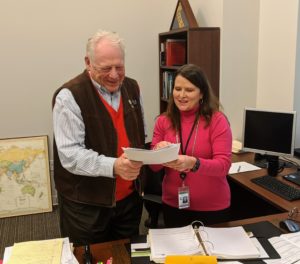A treatment court for military veterans is on the horizon in Catawba County.
The new treatment court will begin in January 2021 and provide assistance to veterans who have contact with the court system in Catawba County when a 10th judge is added for the judicial district.
Tammy West, a legal assistant with the 36th Prosecutorial District Attorney’s Office in Catawba County, has been among those spearheading the effort to bring a treatment court for veterans to the county.
“Veterans have done so much for us as a nation,” West said. “We have no idea what they go through for us. What they see and do can be very bad, but they do it because they believe in a greater cause. This is a small way we can give back to them in their time of need.”
West and District Attorney Scott Reilly both had sons who served in the military, so they know first-hand some of the issues veterans deal with on a daily basis.
“We have a heart for veterans. We want to give back because we know what their (veterans’) sacrifice causes,” West said.
Reilly added, “We depend on our brave men and women to answer the call to defend our freedom. We must also be there to support them by providing resources to address their needs and issues by doing our best to get them well again. This Veterans’ Treatment Court is designed to meet the particular needs of veterans involved in the criminal justice system.”
Dennis Bennett, a retired U.S. Army veteran, has been an advocate of the treatment court to assist veterans for severalyears. He is glad to see that a vision has become a reality.
“Veterans’ Treatment Court in Catawba County will restore health to veterans, their families, work places and the community as a whole. It will save lives, period,” Bennett said. “I’m truly grateful for the vision of justice that District Attorney Scott Reilly brings to our community. He is dedicated to the wellness of our community as a DA in promoting justice and welfare.”
Data indicates that Catawba County has more than 9,600 veterans in its population.
In order to bring the treatment court to fruition, a 10-person team was formed to administer the program. It consists of a coordinator, judge, prosecutor, defense attorney, treatment provider, law enforcement, veteran mentor coordinator, veteran justice outreach coordinator (through the Office of Veterans Affairs) and an evaluator. Most of the team members are veterans.
The court was approved for a federal training program through Justice for Vets just two weeks ago following an application process. That will include three days of intensive training and a total of six months’ worth of training for all those who will be part of the treatment court for veterans. Since Catawba was selected from the application process for the treatment court, the training will be provided at no expense.
The court also will be offered at no expense to taxpayers. All parties involved are volunteering time to make the program work.
The treatment court will be just the fifth in North Carolina, joining Buncombe, Cumberland, Forsyth and Harnett counties in providing such assistance to veterans who have cases in the court system.
“We have worked very hard to bring a Veterans’ Treatment Court to Catawba County,” Reilly said. “We believe that a team effort to rehabilitate these veterans will reduce the risk of recidivism by treating the underlying causes of their criminal behavior. We are committed to helping veterans get the help they need to get them back on track.”
Top criminal offenses for veterans across the state the last two years include financial/property crimes, driving while impaired, assault and drug charges. The court will assist veterans with those charges and others while addressing underlying issues that often lead to such criminal offenses. Chief among those are post-traumatic stress disorder (PTSD), traumatic brain disorders, depression, military sexual trauma and adjustment disorder.
A primary component of the treatment court is that it will be veterans helping other veterans. Every veteran in the program – no more than 25 to 30 participating annually – will have another veteran serving as a mentor. That mentor will provide accountability, a listening ear, transportation and any assistance needed when dealing with the Veterans Affairs (VA) office.Those veterans serving as mentors have a better understanding of what veterans deal with because they have had similar experiences.
“The piece that may be most beneficial for veterans is that they will be mentored by other veterans,” West said. “It will be veterans helping veterans. They have been there, done that and can better help understand the issues they face.”
The premise of the treatment program is three-fold. First will be a focus on stabilizing living situations for veterans to provide food, shelter, clothing and other basic needs. Second will be addressing underlying issues such as drug and/or alcohol addiction and mental health issues through local treatment providers and the VA. Finally, after care and training(educational and vocational) to lead a productive life when the treatment court ends will be provided.
Contact with the treatment court and its programs for veterans will last approximately 18 to 24 months.
CUTLINE FOR PHOTO: Dennis Bennett, left, and Tammy West look over paperwork regarding the new Veterans’ Treatment Court that will start in 2021 in Catawba County.
CONTACT: Nathan Key
Phone: 828-695-6193
Email: Nathan.D.Key@nccourts.org

